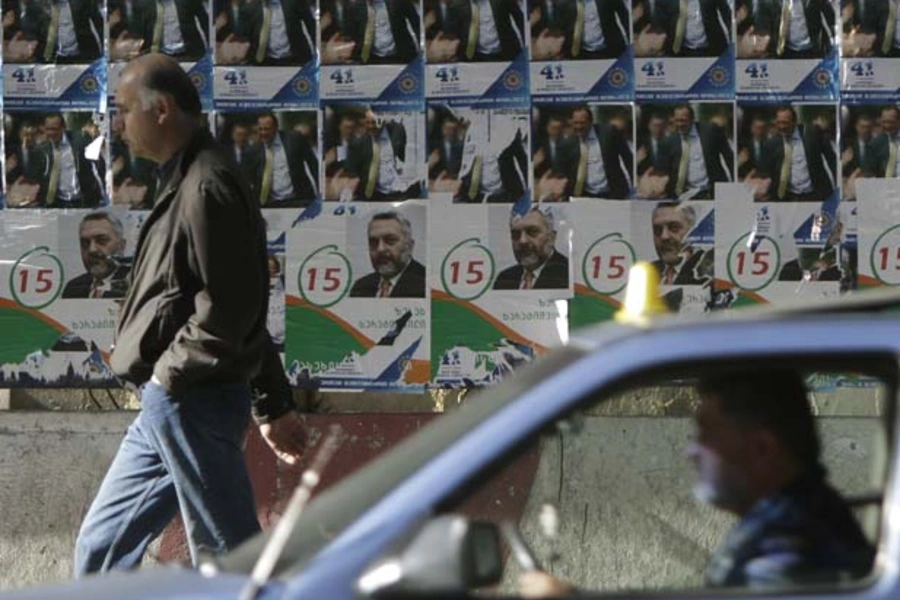The World Next Week: Georgia Votes for President, the Organization for the Prohibition of Chemical Weapons Reports on Syria, Iraqi Prime Minister Al-Maliki Visits Washington, and the World Series Returns

The World Next Week podcast is up. Bob McMahon and I discussed the Georgian presidential elections, the Organization for the Prohibition of Chemical Weapons (OPCW) report on Syrian chemical weapons, Iraqi prime minister Nouri al-Maliki’s trip to Washington, and the 109th World Series.
[audio: http://www.cfr.org/content/publications/media/editorial/2013/20131024_T…]
The highlights:
- Georgia (the country, not the state) holds presidential elections on Sunday. Mikheil Saakashvili, the current president, is barred by law from running for a third term. Giorgi Margvelashvili of the ruling Georgian Dream Party, Davit Bakradze of the incumbent UNM Party, and Nino Burjanadze of Democratic Movement-United Georgia Party are the main contenders. Whoever wins—and a run-off election may be needed—will be less powerful than President Saakashvili. New constitutional provisions will go into effect with the presidential inauguration, shifting most of the president’s authority to the prime minister. The next president will also have to find a way to work with Moscow. Russian troops invaded Georgia back in 2008, and Russian officials recently have been exerting more and more pressure on its former republics to turn away from Europe and back toward Moscow.
- The Organization for the Prohibition of Chemical Weapons (OPCW), fresh off its Nobel Peace Prize, is set to report to the UN Security Council on Monday about the progress it has made in Syria. At last count OPCW has inspected eighteen of the twenty-three chemical weapons sites that the Syrian government has declared. OPCW officials say they should meet their November 1 deadline to destroy Syria’s declared production and mixing equipment for chemical weapons. U.S. intelligence agencies, however, believe that Syria has as many as forty-five chemical weapons sites. The OPCW will use its report, as well as a report Syria is required to submit by this Sunday on its chemical stockpile, to craft a plan and timeline for destroying the actual weapons themselves. That plan is due by November 15. So things are moving rapidly.
- Iraqi Prime Minister Nouri al-Maliki meets with President Obama at the White House next week. The two leaders will discuss regional issues and U.S.-Iraq cooperation. The news coming out of Iraq in recent months has been bleak. A wave of car bombings has produced horrific casualties, the sectarian divide has worsened, and autocracy rather than democracy seems to be on the rise. The White House likely has little influence over events in Iraq, and its attention is absorbed by the many other problems in the region.
- The Boston Red Sox and the St. Louis Cardinals opened up the 109th World Series last night, with the Red Sox taking the first game of the best of seven series, 8-1. The series features players from six countries: the United States, Aruba, Canada, the Dominican Republic, Japan, and Venezuela. The World Series may not be as global as the World Cup, but it’s not just an American game anymore. And yes, my heart will break if the Red Sox lose.
- Bob’s Figure of the Week is Prince Turki bin Faisal al Saud. My Figure of the Week is 0.1 percent. Our audience-nominated Figure of the Week comes from TWNW listener @novenagates who picked 70.3 million. As always, you’ll have to listen to the podcast to find out why.
For more on the topics we discussed in the podcast check out:
Georgian Presidential Elections: Civil.ge has a guide to the Georgian election. The Washington Post explains the turbulence surrounding this election. The Carnegie Endowment for International Peace explains why Georgian elections are never dull. Reuters discusses the future of Georgian politics. Gallup charts the political sentiment in Georgia.
OPCW Report: The OPCW posts its mission updates. The Guardian reports that the OPCW is optimistic that it will meet its deadlines. The UN News Centre covers the progress of inspections. The New York Times describes the difficulties the OPCW had accessing weapons sites. CFR provides the UN Resolution on Syrian Chemical Weapons.
Prime Minister Al-Maliki Visit: The White House releases an outline of the meeting. The Hill argues that Washington could use the visit to send a message to Iran. Marc Lynch argues that Iraq needs to get its own house in order before it can play a larger role in the Middle East. The BBC profiles Nouri Al-Maliki. CFR has a timeline of the Iraq War.
World Series: Sports Illustrated experts predict the World Series outcome. The Bleacher Report charts paths to victory for Boston and St. Louis. The Boston Globe writes that this World Series is too friendly and celebrates Boston’s game one victory. The St. Louis Post-Dispatch laments the Cardinals’ troubles with the Red Sox. The New York Daily News summarizes the World Series history of the Red Sox and the Cardinals.
 Online Store
Online Store